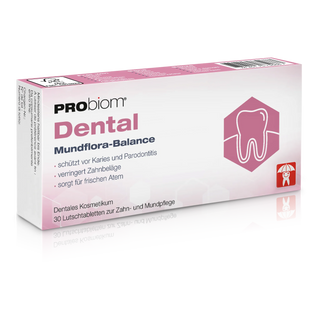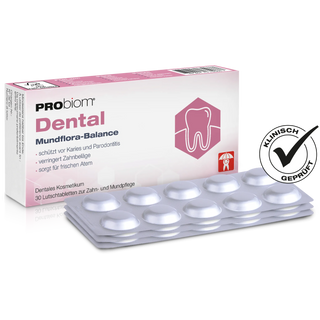The importance of probiotics for gut health is widely known, but did you know that probiotics can also play an important role in oral health? In this blog post, you will learn what probiotics are, how they can be used in oral care, and what benefits they have for your dental health.
What are probiotics?
Probiotics are live microorganisms that, when consumed in sufficient quantities, have beneficial effects on health. They occur naturally in our bodies and can be found in fermented foods such as yogurt, kefir, sauerkraut or dietary supplements.
In the context of oral health, probiotics aim to bring the oral microbiome - the totality of all microorganisms in the oral cavity - into a healthy balance. An unbalanced microbiome can lead to the proliferation of harmful bacteria that cause diseases such as tooth decay, gum disease or bad breath.
How does the oral microbiome work?
The microbiome in the oral cavity is a highly complex ecosystem consisting of over 700 species of bacteria. Most of these microorganisms are harmless and some are even beneficial because they help control the proliferation of harmful germs.
A healthy balance in the microbiome protects against:
- Tooth decay : Harmful bacteria such as Streptococcus mutans produce acids that attack tooth enamel.
- Gum disease : Inflammatory diseases such as gingivitis or periodontitis are caused by harmful germs in the gum area.
- Bad breath : Bacteria that release sulfur compounds can cause unpleasant odors.
Probiotics can promote this balance by crowding out harmful bacteria and supporting the growth of beneficial bacteria.
How do probiotics affect oral health?
Probiotics work in several ways to positively influence the microbiome in the mouth:
- displacement of harmful bacteria
Probiotics compete with pathogenic bacteria for nutrients and binding sites on the mucous membranes and teeth. This inhibits the growth of harmful bacteria.
- Promoting a healthy pH level
A balanced pH value in the oral cavity prevents the formation of acid, which can damage tooth enamel.
- strengthening the immune system
Probiotics support the immune system in fighting inflammation and infections in the mouth.
- production of antimicrobial substances
Some probiotics produce substances such as bacteriocins, which can directly kill harmful microorganisms.
Which probiotics are particularly effective for oral health?
Certain strains of probiotics are particularly helpful for oral care. These include:
- Lactobacillus reuteri : Reduces inflammation and can relieve gingivitis.
- Streptococcus salivarius M18 : Helps prevent bad breath, tooth decay, gingivitis and periodontitis.
- Lactobacillus casei : Helps inhibit Streptococcus mutans , the main cause of tooth decay.
These strains are often found in specially developed oral care products such as probiotic toothpastes, mouthwashes or lozenges.
Areas of application of probiotics for oral care
- prevention of caries
Probiotics can reduce plaque formation and regulate acid production in the mouth.
- fighting gum disease
Due to their anti-inflammatory properties, probiotics help reduce gum inflammation and promote long-term oral health.
- improvement of breathing
Probiotics can neutralize sulfur compounds that cause bad breath.
- Support after antibiotic treatment
After antibiotic therapy, the oral microbiome can be weakened. Probiotics help to restore balance.
How are probiotics integrated into daily oral care?
Using probiotics for oral health is simple and can be done through the following methods:
- Lozenges or chewing gum : These release the probiotics directly into the oral cavity.
- Probiotic mouthwashes : They combine the cleansing effect with the support of the microbiome.
- Probiotic toothpastes : They contain beneficial strains of bacteria that become active while you brush your teeth.
What does science say?
Numerous studies prove the positive effects of probiotics on oral health:
- A 2021 study showed that probiotic lozenges can significantly reduce the number of Streptococcus mutans in saliva.
- Other studies show that the probiotic strain Streptococcus salivarius M18 Probiotics improve the symptoms of gingivitis and periodontitis by inhibiting inflammation.
However, scientists emphasize that probiotics are not a substitute for traditional oral care such as brushing or flossing, but can complement them.
Conclusion
Probiotics are an exciting new approach to oral care that can promote the balance of the oral microbiome and improve oral health. They offer a natural and gentle way to prevent tooth decay, gum disease and bad breath.
If you're interested in adding probiotics to your routine, talk to your dentist about appropriate products. A combination of probiotic care and good hygiene practices is the key to a healthy smile.














